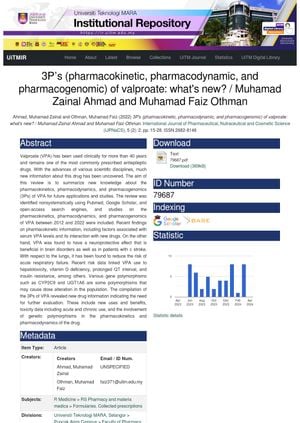3P's of Valproate: Pharmacokinetic, Pharmacodynamic, and Pharmacogenomic Updates

TLDR New information shows Valproate may protect the brain and reduce breathing failure risk but can cause liver damage and other side effects, with genetics affecting dosage needs.
The review "3P's (Pharmacokinetic, Pharmacodynamic, and Pharmacogenomic) of Valproate: What's New?" provides updated information on the drug Valproate (VPA), a commonly prescribed antiepileptic medication. Recent findings reveal that VPA has a neuroprotective effect beneficial for brain disorders and stroke patients, and it can also reduce the risk of acute respiratory failure. However, VPA use has been linked to hepatotoxicity, vitamin D deficiency, prolonged QT interval, and insulin resistance. Additionally, gene polymorphisms such as CYP2C9 and UGT1A6 may cause dose alteration in the population. This new information indicates the need for further evaluation of VPA, including its new uses and benefits, toxicity data, and the involvement of genetic polymorphisms in the drug's pharmacokinetics and pharmacodynamics.



